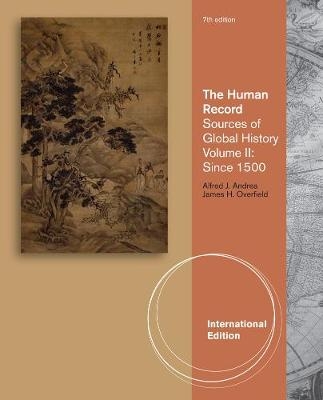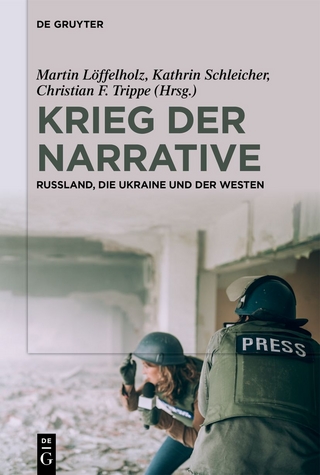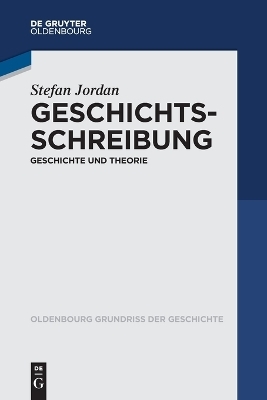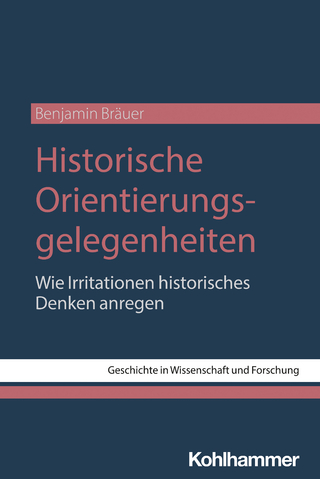
The Human Record
Wadsworth Publishing Co Inc (Verlag)
978-1-111-34136-7 (ISBN)
- Titel ist leider vergriffen;
keine Neuauflage - Artikel merken
THE HUMAN RECORD, International Edition is the leading primary source reader for the World History course, providing balanced coverage of the global past. Each volume contains a blend of visual and textual sources which are often paired or grouped together for comparison. A prologue entitled “Primary Sources and How to Read Them” appears in each volume and provides background and guidance for analyzing sources such as those in the text. Approximately one-third of the sources in the Seventh Edition are new, and these documents continue to reflect the myriad experiences of the peoples of the world.
Alfred Andrea received his Ph.D. from Cornell University. He is Professor Emeritus of History at the University of Vermont, where he taught from 1967 through 2001. His initial training concentrated on medieval European history, with an emphasis on Byzantine-Western relations and the Crusades. He has since published four books on the Crusades, as well as numerous articles on a variety of historical issues. For the past thirty years, his teaching, research, and writing have focused increasingly on world history before 1600, with a particular interest in cross-cultural contacts across the Silk Road. In 2002 he was Distinguished Scholar-in-Residence at the University of Louisville, and he served as president of the World History Association (WHA) in 2010-2012. In 2014, the WHA recognized him as a Pioneer of World History. James H. Overfield, Professor Emeritus at the University of Vermont, received his BA from Dension University, his MA from the University of Chicago, and his PhD from Princeton University. During his career at Vermont he received the University’s outstanding teacher award, and served many years as Department of History Chair, in which capacity he was a strong advocate for the study and teaching of global history. His publications include Humanism and Scholasticism in Late Medieval Germany (Princeton University Press, 1984), as well as numerous articles on late medieval and early modern European thought. He served as editor for three volumes (1750-1914) of the ABC-CLIO World History Encyclopedia and is author of Sources of Global History since 1900 (Cengage: 2013).
Part I: AN ERA OF CHANGE AND INCREASED GLOBAL INTERACTION: THE FIFTEENTH THROUGH SEVENTEENTH CENTURIES.
1. Europe in an Age of Conflict and Expansion.
European Expansion: Afonso d’Albuquerque, Speech to Men of the Portuguese Fleet before the Second Attack on Melaka (August 11, 1511); Ferdinand of Aragon and Isabella of Castile, Agreements with Columbus, April 17 and April 30, 1492; Richard Hakluyt, A Discourse on Western Planting Martin. Religious Controversy in the Reformation Era: Luther, Table Talk; Lucas Cranach the Younger, Two Kinds of Preaching: Evangelical and Papal. Marriage and Families in Early Modern Europe: Leon Battista Alberti, Book of the Family; Jan van Eyck, The Arnolfini Portrait; Erhard Schön, No More Precious Treasure Is on the Earth Than a Gentle Wife Who Longs for Honor. An Expanding Intellectual Universe: Letter of Cencio de’ Rustici to Francesco de’ Fiana and Letter of Leonardo Bruni to Poggio Bracciolini; Raphael di Santi, School of Athens; Michel de Montaigne, “On Cannibals”; Galileo Galilei, Letter to the Grand Duchess Christina.
2. The Islamic Heartland and India.
Rulers and Their Challenges in the Ottoman, Safavid, and Mughal Empires: Ogier Ghiselin de Busbecq, Turkish Letters; Eskandar Beg Monshi, History of Shah Abbas the Great; Jahangir, Memoirs. Religion, Society, and Culture in South and Southwest Asia: Sultan Selim I, Letter to Shah Ismail of Persia; Khayral-Din Ramli, Legal Opinions; Abul Fazi, Akbarnama; Lord Krishna Lifts Mount Govardhan and Jahangir’s Dream.
3. Africa and the Americas.
Multiple Voices I: Africa’s Diversity through Visitors’ Eyes: Leo Africancus, History and Description of Africa; Olfert Dapper, An Accurate Description of the Regions of Africa; Domãio de Góis, Chronicle of King Manuel the Fortunate; Duarte Barbosa, Account of the Countries Bordering on the Indian Ocean and their Inhabitants.
Africans and the Portuguese: Nzinga Mbemba (Alonso I), Letters to the King of Portugal; A Benin-Portuguese Saltcellar and A Benin Wall Plaque; João dos Santos, Eastern Ethiopia. Encounters in the Americas: Bernardino de Sahagún, General History of the Things of New Spain; David Pieterzen DeVries, Voyages from Holland to America. Land and Labor in Spanish America: Alonso de Zorita, The Brief and Summary Relation of the Lords of New Spain; Antonio Vazquez de Espinosa, Compendium and Description of the West Indies
4. Continuity and Change in East and Southeast Asia.
Confucianism in China and Japan: Meritorious Deeds At No Cost; Kaibara and Token Ekiken, Common Sense Teachings for Japanese Children and Greater Learning for Women; Wang Daokun, Biographies of Zhu Jiefu and Gentleman Wang; Zhang Hong, Landscape of Shixie Hill and Sheng Maoye, Scholars Gazing at a Waterfall. Political Decline in China and Political Recovery in Japan: Yang Lien, Memorial to Emperor Ming Xizong Concerning Eunuch Wei Zhongxian.
Multiple Voices II: The Reunification of Japan Under Hideyoshi and the Tokugawa Clan: Edicts on Christianity; Edict on the Collections of Swords (1588); Edict of the Change in Status, 1591; Laws Governing the Military Households (1615); Closed Country Edict (1635).
Part II: A WORLD IN TRANSITION, FROM THE MID-SEVENTEENTH CENTURY TO THE EARLY NINETEENTH CENTURY.
5. Europe and the Americas in an Age of Science, Economic Growth, and Revolution.
An Age of Monarchy – Absolute and Limited: Jacques-Bénigne Bossuet, Polititics Derived from the Worlds of Holy Scripture; Peter the Great, Edicts and Decrees; English Bill of Rights. An Age of Science and Enlightenment: Sébastien Le Clerc, The Royal Academy and Its Protectors and A Dissection at the Jardin Des Plantes; Voltaire, Treatise on Toleration; Marquis de Condorcet, Sketch of the Progress of the Human Mind. Stirrings of Economic Change: Adam Smith, The Wealth of Nations; Petition of the Yorkshire Cloth Workers (1786) and Proclamation of the Leeds Cloth Merchants (1791). The Era of the French Revolution and Napoleon: Declaration of the Rights of Man and of the Citizen; Decree for Proclaiming the Liberty and Sovereignty of All People, Proposal for the Levée en masse; Report of the Committee of Public Safety on Drafting Poets and Citizens for the Cause of Revolution; Report of the Committee of Public Safety on Revolutionary Education; Jacques-Louis David, Napoleon Crossing the Alps and Napoleon in His Study. Anticolonialism and Revolution in the Americas: Thomas Paine, Common Sense; Simón Bolívar, The Jamaica Letter.
6. Africa, Southwest Asia, and India in the Seventeenth and Eighteenth Centuries.
The African Slave Trade and Its Critics: Olaudah Equiano, The Interesting Narrative of Olaudah Equiano Written by Himself.
Multiple Voices III: Ending the Slave Trade: European and African Perspectives: John Wesley, Thoughts Upon Slavery; Society of the Friends of Black, Address to the National Assembly in Favor of the Abolition of the Slave Trade; W.S. Ryneveld, Response to Governor Macartney’s Questionnaire; Joseph Dupuis, Summary of a Conversation with Osei Bonso, King of Asante.
Political Change in the Ottoman and Mughal Empires: Mehmed Pasha, The Book of Counsel for Viziers and Governors; Joseph François Dupleix, Memorandum to the Directors of the French East India Company, Robert Clive, Letter to William Pitt the Elder; Shah Alam II, Imperial Firman; Najm-ud-daula, Agreement; East India Company and the Nizam of Oudh, Treaty. The Continuing Vitality of Islam: Abdullah Wahhab, The History and Doctrines of the Wahhabis; Usman dan Fodio, Selections from His Writings.
7: Change and Continuity in East Asia.
China’s Revival Under the Qing: Kagxi, Self-Portrait; Qianlong at Leisure on New Years Eve; Taking a Stag with a Mighty Arrow; Qianlong in his Study; Envoys from Vassal States and Foreign Countries Presenting Tribute to the Emperor; Sir Henry Dundas, Letter to Lord George Macartney; Emperor Qianlong, Edict on Trade with Great Britain. Social Change and Intellectual Ferment in Tokugawa Japan: Kamo Mabuchi, A Study of the Idea of the Nation; Honda Toshiaki, A Secret Plan of Government; Shiba Kokan, A Meeting of Japan, China and the West.
Part III: THE WORLD IN THE AGE OF WESTERN DOMINANCE: 1800-1914.
Chapter 8: The West in the Age of Industrialization and Imperialism.
Multiple Voices IV: Working Class and Middle Class in Nineteenth Century Europe: Testimony Before Parliamentary Committees on Working Conditions in England; Louis Velermé, Study of the Physical Condition of Cotton, Wool and Silk Workers; Alexander Schneer, Living Conditions of the Working Class in Breslau; Samuel Smiles, Self Help and Thrift; Otto von Leixner, Letters from Berlin.
New Perspectives on Humanity and Society: Karl Marx and Friedrich Engels, The Communist Manifesto; Charles Darwin, On the Origins of Species and the Descent of Man. Millions on the Move: Nineteenth-Century Migration: Gottfried Menzel, The United States of North America, With Special Reference To German Emigration; Henry Cabot Lodge, Speech To the United States Senate, March 16, 1896; Joseph Keppler, “Make Yourself Welcome!’ and “Looking Backward”; F. Victor Gillam, “The Cause of it All”; Louis Dalrymple, “The Unrestricted Dumping Grounds”. Women in Society: From “Separate Spheres” to Suffragism: Sarah Stickney Ellis, The Wives of England; Emmeline Pankhurst, Why We Are Militant; English Posters and Postcards, 1908–1914. Nationalism and Imperialism in the Late Nineteenth Century: Heinrich von Treitschke, Extracts from History of Germany in the Nineteenth Century and Historical and Political Writings; Jules Ferry, Speech Before the French National Assembly; Advertisements and Illustrations from British Books and Periodicals.
9. Western Pressures, Nationalism, and Reform in Africa, Southwest Asia, and India in the 1800s.
The European Assault on Africa: Lagos Treaty of Succession, August 6, 1861 & Treaty Between the International Association of the Congo and the kings and chiefs of the Ngombi and Mafela & Agreement between King Logenbula and Charles Rudd, Rochfort Maguire, and Francis Thompson & Letter of King Lognebula to Queen Victoria; George Washington Williams, Open Letter to King Leopold II of Belgium, 1890; King Leopold II, Open Letter to the Officials of the Congo Free State 1897; Ndansi Kumalo, His Story. Currents of Change in Southwest Asia: Sultan Abdulmejid, The Islahat Fermani of 1856; Abd al-Rahman al-Kawakibi, Umm al-Qura (Mother of Towns); An Agreement between G. F. Talbot and the Persian Government, March 8, 1890.
Multiple Voices V: The Beginnings of Islamic Modernism: Sayyid Jamal a-Din al-Afghani, “Teaching and Learning” and “Answer to Renan”; Qasim Amin, The Liberation of Women and The New Woman; Muhammad Husayn Na’ini, Government from the Perspective of Islam.
India Under British Domination: Rammohun Roy, Letter to Lord Amherst; The Azamgarh Proclamation; Dadabhai Naoroji, Address to the Indian National Congress, 1886 & Bal Gangandhar Tilak, Address to the Indian National Congress, 1906.
10. East and Southeast Asia Confront the West.
Encounters with the West: Lin Zexu, Letter to Queen Victoria, 1839; U.S. President Millard Fillmore, Letter to His Imperial Majesty, the Emperor of Japan; Phan Thanh Gian, Letter to Emperor Tu Duc and Last Message to His Administrators.
Multiple Voices VI: Plotting East Asia’s Future: Tokugawa Nariaki, Memorandum to the Bakufu, August 14, 1953; Ii Naosuke, Memorandum to the Bakufu, October 1, 1953; Feng Guifen, Personal Protests from the Study of Jiaobin; Woren, Memorandum on Western Studies.
The Emergence of Modern Japan: Iwasaki Yataro, Letter to Mitsubishi Employees; Prints and Drawings, 1853-1891. The End of Imperial China: Qiu Jin, An Address to Two Hundred Million Fellow Countrywomen; Chinese Revolutionary Alliance, Revolutionary Proclamation, 1907.
Part IV: THE GLOBAL COMMUNITY AND ITS CHALLENGES IN THE TWENTIETH AND TWENTY-FIRST CENTURIES.
11. The Industrialized World in Crisis.
The Trauma of World War I: Popular Art and Poster Art from Germany, England, and Australia; Henry S. Clapham, Mud and Khaki, Memoirs of an Incomplete Soldier; Paul Nash, The Menin Road & C. R. W. Nevinson, The Harvest of Battle & Otto Dix, Shock Troop under Gas Attack. The Russian Revolution and the Foundation of the Soviet State: Communist Decrees and Legislation, 1917-1918; Joseph Stalin, The Tasks of Business Executives. Liberalism and Democracy Under Siege: Benito Mussolini, The Political and Social Doctrine of Fascism; Adolf Hitler, Mein Kampf; Six Political Posters. The Legacy of World War II: Rudolf Höss, Memoirs; Iwao Nakamura and Atsuko Tsujioka, Recollections.
Multiple Voices VII: The Decision to Drop the Atomic Bomb: Memorandum of Conversation with General Marshall; Arthur Compton, Recollection of Interim Committee Meeting; The Franck Report; The Szilard Petition; President Harry Truman, Letter to Samuel Cavert.
12. Anticolonialism, Nationalism, and Revolution in Africa, Asia, and Latin America.
African Society and Identity Under Colonial Rule: James Aggrey, Parable of the Eagle; Kabaka Daudi Chwa, Education, Civilization, and “Foreignization” in Buganda. New Beginnings in the Middle East: Mustafa Kemal, Speech to the Congress of the People’s Republican Party; Report of the Palestine Royal Commission (The Peel Commission), July 1937. Anticolonialism in India and Southeast Asia: Mohandas Gandhi, Indian Home Rule; Nguyen Thai Hoc, Letter to the French Chamber of Deputies. Latin America in an Era of Economic Challenge and Political Change: Francisco Garcia Calderón, Latin America: Its Rise and Progress; Lázaro Cárdenas, Speech to the Nation. China in an Era of Political Disintegration and Revolution: Deng Yingchao, The Spirit of the May 4th Movement; Mao Zedong, Report on an Investigation of the Peasant Movement in Hunan and Strategic Problems of China’s Revolutionary War.
13. The Global Community Since 1945.
The 1950s and 1960s: Cold War Origins and Decolonization: National Security Council, United States Objectives and Programs for National Security (NSC Paper Number 68); Nikita Khrushchev, Speech at Reception for Military Academy Graduates, November 1958. The End of Europe’s Empires: Debate in the House of Commons, March 4 and 5, 1947. Problems and Prospects of Postcolonial Asia and Africa, 1960s–1980s: C. Odumegwu Ojukwu, Speeches and Writings; Jawaharlal Nehru, “A Secular State” and Girilal Jain, “The Harbinger of a New Order”; Lao Dong, Party Directive for the South: “Situation and Tasks for 1959”; Tan Manni, “Lushan’s Pig-Iron ‘Sputnik’”. Women between Tradition and Change, 1960s–1970s: National Organization of Women, 1966 Statement of Purpose and Westchester Radical Feminist Manifesto, 1972; Zand Dokht, “The Revolution that Failed Women”; Association of African Women for Research and Development, A Statement on Genital Mutilation; Editorial Against Dowry from Manushi. Communism’s Retreat: Deng Xiaoping, Speeches and Writings; Mikhail Gorbachev, Perestroika. Terrorism in a Global Age: Osama bin Laden, Declaration of Jihad Against Americans Occupying the Land of the Two Holy Mosques; Mohammed Atta, The Last Night; World Bank, World Development Indicators.
| Erscheint lt. Verlag | 1.1.2011 |
|---|---|
| Verlagsort | Belmont, CA |
| Sprache | englisch |
| Maße | 185 x 226 mm |
| Gewicht | 839 g |
| Themenwelt | Geisteswissenschaften ► Geschichte ► Geschichtstheorie / Historik |
| ISBN-10 | 1-111-34136-2 / 1111341362 |
| ISBN-13 | 978-1-111-34136-7 / 9781111341367 |
| Zustand | Neuware |
| Haben Sie eine Frage zum Produkt? |
aus dem Bereich


